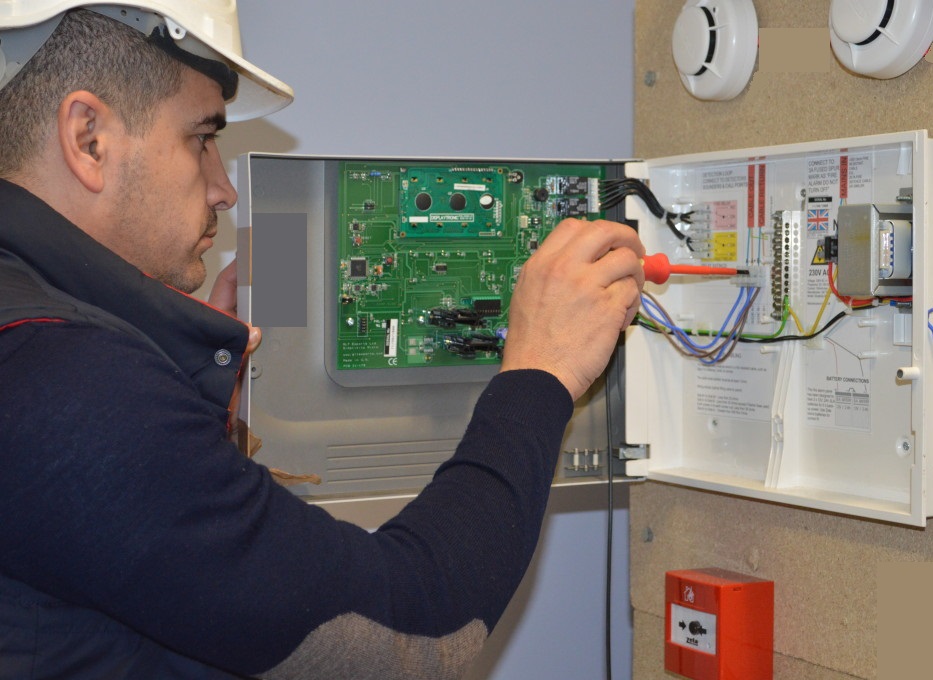Fire Alarm Installation Course
Cube Level 3
- Course title: Level 3 Award in the Requirements of Fire Detection and Fire Alarm Systems for Buildings BS 5839-1:2017
- Code: CUBE603/4906/2
- Course duration: 3 Days
- Course fee: £895.00
- Awarding body: Cube
- Level: 3
This course will teach you about a range of industrial fire alarm panels and their components. You’ll learn how the devices work together in a fire alarm system and how they should be configured, connected and tested. By the end of the course you will be able to:
- Demonstrate the basic key concepts and all the components.
- Install, test and maintain conventional and addressable fire alarm systems.
- Recognise the role of outputs, automatic and manual detectors.
- Describe the differences between fire alarm categories and grades.
- Explain the role of a fire alarm installer.
- Effectively work with other stakeholders in fire alarm installation.

Take a look at the course outline below, and head over to our FAQ page if you have any queries.
Fire Alarm Installation Course
An automatic fire alarm system is an essential part of any building’s safety and security system. It is designed to detect the presence of smoke or heat and alert occupants of a potential fire. The system is designed to provide early warning of a fire, allowing occupants to evacuate the building quickly and safely. The importance of an automatic fire alarm system cannot be overstated. It is the first line of defence against a fire and can help save lives and property. An automatic fire alarm system typically consists of smoke detectors and/or heat detectors connected to control and indicating equipment that is triggered when a certain threshold is reached.
An automatic fire alarm system is essential for domestic and commercial building safety, and it detects the presence of smoke or heat and alerts occupants of a potential fire.
In the UK, it is a legal requirement for all commercial and residential buildings to have a fire alarm system installed. The fire alarm installation course includes automatic fire detection systems installed in commercial and domestic buildings.
Installation of a fire alarm system must adhere to the applicable British Standard BS 5839-1.
What will you learn in this Fire Alarm installation course?
Cube’s accredited fire alarm installation course teaches students the basics of installing and maintaining fire alarm systems. Students learn about the different types of fire alarm systems (addressable and conventional), their components, and how to install them. They will also learn about the code of practice, which they must follow when installing a fire alarm system. Additionally, students learn about the different types of fire detectors, their placement, and how to test them. Finally, students learn about the different types of fire alarm control panels (Addressable, and conventional panels) and how to program them.


What sets us apart from others?
EAL approved centre
ELCAS approved centre
Over 3,000 Learners
Hands-on Training
Job Hunting Support
Unit 1:Understand the general requirements of BS 5839-1
- History & importance of fire alarm systems, the different stakeholders, the role and responsibilities of an installer, automatic & manual detectors, control panel, addressable, conventional, and basic outputs.
Unit 2: Design considerations for fire detection and fire alarm systems for buildings
- This unit provides a thorough exploration of the key factors and considerations involved in designing effective and compliant fire detection and alarm systems.
Unit 3: BS 5839-1 and installation of fire detection and fire alarm systems
- Conventional fire alarm system installation with smoke, heat, MCP and outputs. Addressable fire alarm installation with smoke, heat, MCP and outputs.
Unit 4: Electrical Principles & Fire Alarm Installation
- Ohm’s Law, voltage drop calculation, backup battery calculation, electrical health and safety, cable segregation EN 50174-2:2000.
Unit 5: Methodology & Testing Methodology
-
Testing a fire alarm system, fire alarm installation methodology, role and responsibilities of a fire alarm installer, fire alarm certifications.
